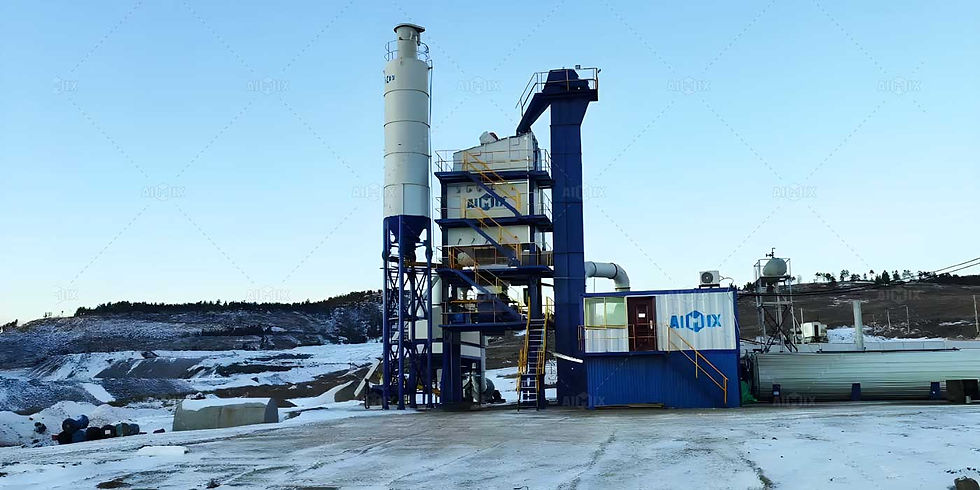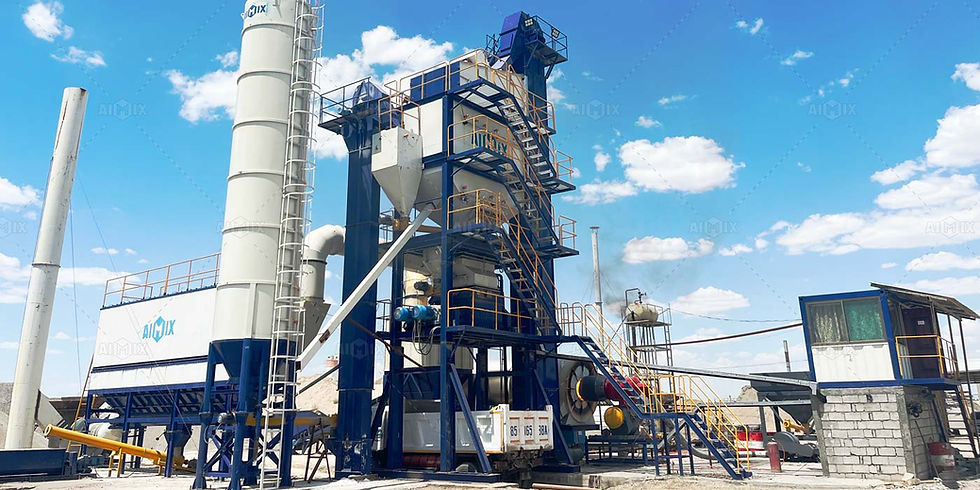Which Batch Mix Asphalt Plant is Suitable for Producing 80–100 Tons per Hour?
- aimixglobal5
- May 8, 2025
- 3 min read
Asphalt plants are a critical part of any large-scale road construction project, and selecting the right batch mix asphalt plant is key to achieving efficient production rates and meeting project deadlines. If you are looking to produce between 80 to 100 tons of asphalt per hour, it’s essential to choose the right asphalt batch plant that balances productivity, fuel efficiency, and long-term reliability. In this post, we’ll walk you through the key considerations for selecting the right batch mix asphalt plant for your needs.

Understanding the Batch Mix Asphalt Plant
Before diving into which model is suitable for your production capacity, let’s first understand what a batch mix asphalt plant is and how it works. A batch mix asphalt plant produces asphalt in batches, meaning that the plant mixes a specified amount of raw materials, like aggregate, binder, and fillers, in controlled conditions before delivering the final product. This process ensures a high level of consistency in the asphalt produced, making it ideal for projects requiring precise specifications.
Why Choose a Batch Mix Asphalt Plant?
Batch mix asphalt plants are preferred in projects that demand high-quality and customized asphalt. They allow for better control over the mixing process, ensuring that the asphalt produced meets the necessary standards for durability, strength, and performance. For projects where the production volume is between 80–100 tons per hour, a hot mix plant strikes the right balance between flexibility and production efficiency.

Key Features to Consider for 80–100 TPH Production
When choosing an asphalt plant for a production rate of 80–100 tons per hour, there are several key features you need to consider to ensure your plant can handle the demands of your project efficiently.
1. Production Capacity
The first and most obvious consideration is the plant's production capacity. A plant producing 80–100 tons per hour should be capable of consistently meeting this output without sacrificing quality. Depending on your project requirements, you may need to opt for a model that can handle peak production rates while maintaining optimal fuel efficiency and low emissions. It’s important to ensure that the plant can easily handle the volume of materials you need for your project.
2. Advanced Control System
Modern batch mix asphalt plants come equipped with advanced control systems that provide real-time monitoring and adjustments during the mixing process. This ensures that the final asphalt mix is consistently high-quality and meets your project specifications. For plants producing 80–100 tons per hour, having a precise control system can significantly enhance productivity and reduce the risk of errors.
3. Fuel Efficiency and Environmental Considerations
With the growing emphasis on sustainability, fuel efficiency and environmental impact are key factors to consider when selecting a batch mix asphalt plant. Models designed to meet 80–100 tons per hour production rates typically feature optimized burner systems and energy-saving technologies, which can lower operating costs and reduce emissions. Look for a plant that not only delivers high productivity but also aligns with environmental regulations.

Popular Models for 80–100 TPH Asphalt Production
Now that you know what to look for in terms of capacity, control, and environmental considerations, let’s explore a few models that are designed to meet the 80–100 tons per hour production range.
1. Medium-Sized Batch Mix Asphalt Plant
This model is ideal for contractors working on medium to large-scale road construction projects. It typically features an 80-100 TPH output and comes with advanced features like automatic aggregate feeders, a high-efficiency mixing unit, and a reliable control system for precision. This type of plant is perfect for projects that require continuous operation without interruptions.
2. Mobile Asphalt Batch Mix Plant
If your project requires flexibility and the ability to move between job sites, a mobile batch mix asphalt plant could be a great solution. Mobile asphalt plants can be easily relocated to different sites and still maintain an output capacity of 80–100 tons per hour. They offer convenience without compromising on production efficiency and quality.
3. Stationary Asphalt Batch Mix Plant
For projects that involve long-term, high-demand production, a stationary batch mix asphalt plant may be the best option. These plants offer greater stability, better integration with other construction equipment, and higher levels of automation. They are ideal for producing large quantities of asphalt in a consistent, high-quality manner.

Conclusion: Choose the Right Batch Mix Asphalt Plant for Your Project
Choosing the right batch mix asphalt plant for producing 80–100 tons per hour involves evaluating your production requirements, environmental considerations, and the flexibility needed for your project. Whether you choose a medium-sized, mobile, or stationary plant, make sure it meets your production needs and offers features that will optimize performance.
If you're ready to invest in a reliable batch mix asphalt plant, we can help guide you through the selection process. Our team is dedicated to providing you with the right equipment tailored to your specific requirements. Reach out today to find the perfect solution for your project!



Comments